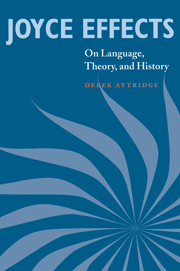Book contents
- Frontmatter
- Contents
- Acknowledgments
- References and abbreviations
- Preface
- Introduction: On being a Joycean
- Chapter 1 Deconstructive criticism of Joyce
- Chapter 2 Popular Joyce?
- Chapter 3 Touching ‘Clay’: reference and reality in Dubliners
- Chapter 4 Joyce and the ideology of character
- Chapter 5 ‘Suck was a queer word’: language, sex, and the remainder in A Portrait of the Artist as a Young Man
- Chapter 6 Joyce, Jameson, and the text of history
- Chapter 7 Wakean history: not yet
- Chapter 8 Molly's flow: the writing of ‘Penelope’ and the question of women's language
- Chapter 9 The postmodernity of Joyce: chance, coincidence, and the reader
- Chapter 10 Countlessness of livestories: narrativity in Finnegans Wake
- Chapter 11 Finnegans awake, or the dream of interpretation
- Chapter 12 The Wake's confounded language
- Chapter 13 Envoi: judging Joyce
- Works cited
- Index
Chapter 5 - ‘Suck was a queer word’: language, sex, and the remainder in A Portrait of the Artist as a Young Man
Published online by Cambridge University Press: 22 September 2009
- Frontmatter
- Contents
- Acknowledgments
- References and abbreviations
- Preface
- Introduction: On being a Joycean
- Chapter 1 Deconstructive criticism of Joyce
- Chapter 2 Popular Joyce?
- Chapter 3 Touching ‘Clay’: reference and reality in Dubliners
- Chapter 4 Joyce and the ideology of character
- Chapter 5 ‘Suck was a queer word’: language, sex, and the remainder in A Portrait of the Artist as a Young Man
- Chapter 6 Joyce, Jameson, and the text of history
- Chapter 7 Wakean history: not yet
- Chapter 8 Molly's flow: the writing of ‘Penelope’ and the question of women's language
- Chapter 9 The postmodernity of Joyce: chance, coincidence, and the reader
- Chapter 10 Countlessness of livestories: narrativity in Finnegans Wake
- Chapter 11 Finnegans awake, or the dream of interpretation
- Chapter 12 The Wake's confounded language
- Chapter 13 Envoi: judging Joyce
- Works cited
- Index
Summary
One of the most remarkable events in the history of literary creativity occurred when James Joyce composed the opening pages of A Portrait of the Artist as a Young Man, pages that move from the earliest remembered experiences of Stephen Dedalus to a particularly memorable fever-ridden day during his first term at Clongowes Wood College. Much has been written about the extraordinary immediacy of these pages, which represent something stylistically unprecedented in Joyce's work, hither-to most notable for the ‘scrupulous meanness’ of Dubliners and the rather long-winded narrative of Stephen Hero. They mark a new departure for European literature, too, catapulting Joyce into the forefront of the modernist movement.
It would be satisfying to be able to date this extraordinary event exactly, and to contemplate the precise cultural and linguistic context within which it took place. Were the opening pages written out in a single burst of creative originality, or were they gradually and laboriously transformed from something very traditional to the radical departure they became? Firm evidence is lacking, however; it was only later that Joyce began scrupulously to keep his notebooks as a kind of huge extension of his published work. We know that he had five long chapters in mind from the start, and that he wrote the first version of chapter 1 in Trieste between September and November of 1907.
- Type
- Chapter
- Information
- Joyce EffectsOn Language, Theory, and History, pp. 59 - 77Publisher: Cambridge University PressPrint publication year: 2000
- 1
- Cited by



